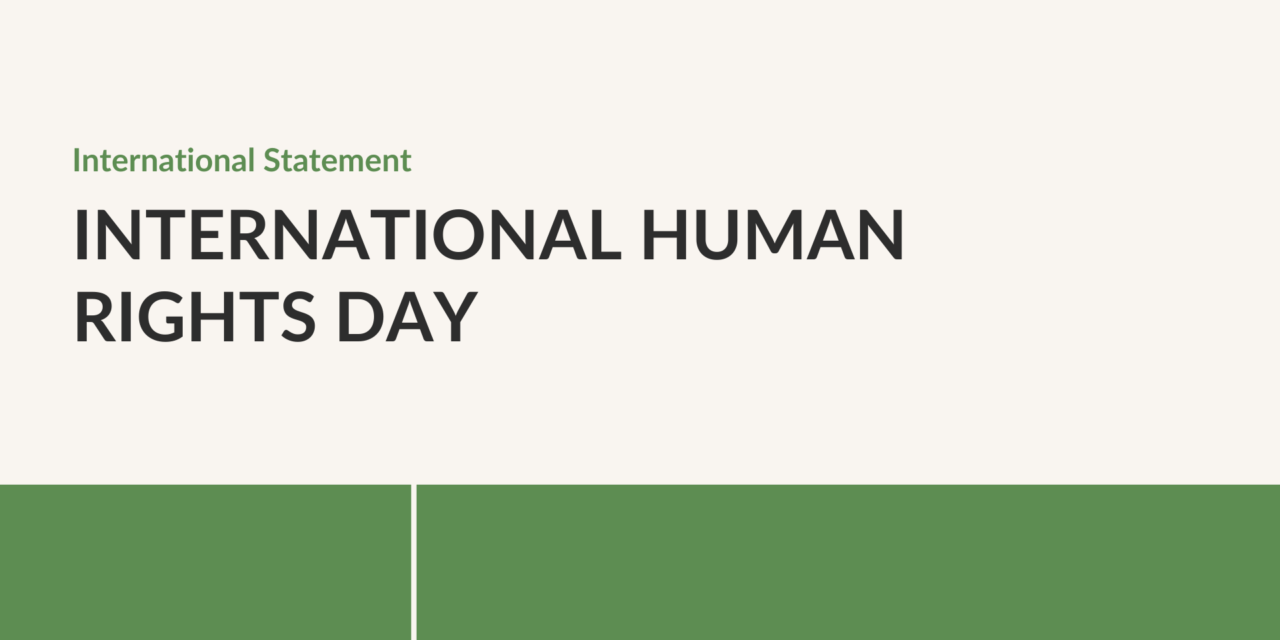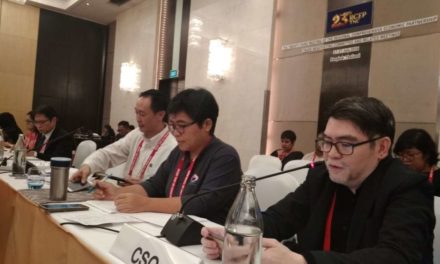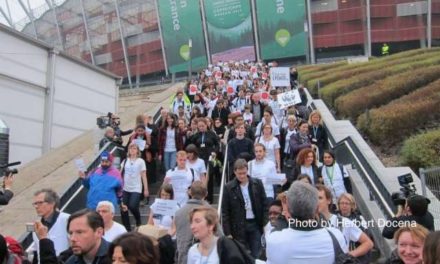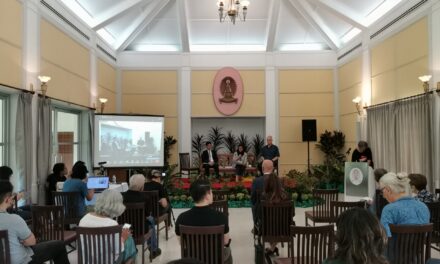Today, December 10, marks the 74th anniversary of the Universal Declaration of Human Rights (UDHR), which sets out, for the first time, the universal protection of fundamental human rights. The UDHR lays out the common standard of achievements for all peoples and all nations for a life of equality in dignity and rights for all, the right to life, liberty and security; freedom of movement, opinion, expression, assembly, and association; equal protection of the law; equal protection against discrimination; and equal access to effective remedy and public services, among others.
Likewise, in seven days, on December 17, we will commemorate the fourth year of the historic victory of peasant and food sovereignty movements on the adoption of the United Nations Declaration on the Rights of Peasants and Other People Working in Rural Areas (UNDROP), which aims to protect the rights of peasants, rural workers, fisherfolk, indigenous peoples, and pastoralists. Three months ago, we also celebrated the 15th anniversary of the adoption of the United Nations Declaration on the Rights of Indigenous Peoples (UNDRIP) that established a universal framework of minimum standards for the survival, dignity and well-being of the indigenous peoples of the world, and for combating discrimination and marginalization.
However, despite the adoption of these Declarations, human rights abuses and violations have continued unabated in different forms against peasants, fisherfolk, rural communities, indigenous peoples, and workers in Asia and across the world. Amidst recurring economic and public health crises, deepening inequality, and accelerating climate change, they continue to face systemic marginalization and discrimination in defending their human rights, lands, territories, and livelihoods. Those who dare to demand and defend their own rights and the rights of their communities are subjected to criminalization, judicial persecution, intimidation, violence, and the use of deadly force.
Neoliberal policies and the intrusion of transnational corporations and extractive industries into rural areas are competing in the exploitation of natural resources and biodiversity. They create operations that directly dispossess, marginalize, and discriminate against rural communities, including women, peasants, indigenous peoples, fisherfolk, pastoralists, agricultural workers, hunter and gatherers, traditional seed breeders, and small-scale family farming communities.
The rights of access, use, ownership of land and territories, and livelihoods of rural people and communities are being violated through various means and mechanisms at national, regional, and international levels. These include economic concessions for industrial, infrastructure, mining, industrial agriculture investment projects, free trade agreements, false solutions to climate change such as Reducing Emissions from Deforestation and Forest Degradation (REDD/REDD+), Green Economy, Blue Economy, nature-based/positive schemes, and national conservation and forest reclamation programs.
In several countries in Asia, national laws (for e.g. the Anti-Terrorism Act in the Philippines, Operations of Not-for-Profit Organizations Bill in Thailand, and Unlawful Activities (Prevention) Act in India, among others) are being used by governments to harass, threaten, intimidate, repress, and criminalize peasants, rural communities, and indigenous people, as well as human rights advocates who stand up for human rights, call for ending impunity, and speak truth to power. Governments in connivance with corporations use such laws to suppress and repress dissent in the name of “public interest,” “national security,” and “peace and development,” and curtail fundamental freedoms, peoples’ rights, and their participation in all spheres of life. State, corporate, and elite impunity is on the increase, and the rule of law in many instances represents the rule of the elite in the country.
Women and girls have been discriminated against historically in the realization of their human rights, while gender discrimination, gender-based violence, and patriarchal practices continue. In the face of shrinking civil society spaces, women human rights defenders who are at the forefront calling for social and gender justice are specifically marginalized, targeted, and often become victims of gender-specific violence and suffer severe violations. While they need effective, inclusive, and gender-responsive protection mechanisms, such mechanisms are absent.
Today, as we commemorate International Human Rights Day, we join communities, organizations, and movements in Asia and around the world in confronting the intensifying waves of repression, criminalization, and violence, and the shrinking space for civil society and progressive political action. We stand in solidarity with peasants, rural communities, workers, women, indigenous peoples, human and environmental rights defenders, and all those who have always been responsible for the protection of life, land, water, forest, territories, dignity, and the environment.
With this statement, we, the undersigned individuals, organizations, and movements add our voices to the continuing struggles for the realization of human rights for all, economic and social justice, and genuine participatory democracy. We call on our governments to:
- Respect, protect, and fulfill human rights by advancing and enforcing UNDROP, UNDRIP, and other relevant international human rights instruments through national legislative and regulatory efforts. Governments must use these instruments as framework for new legislation and public policies to guarantee rights and bring justice to all peasants, rural communities, and indigenous peoples.
- Repeal laws which encourage territory grabbing and harm human rights. Governments must revitalize and recognize pre-existing rights to ancestral domains, natural resources, and self-determination that are already enshrined in international human rights mechanisms.
- End violence and the culture and practice of impunity by states, corporate actors, and all other violators of human rights. All business activities and operations must be subject to robust human rights criteria and standards, with effective remedies for those who face business-related abuses.
- Support the adoption of a legally binding instrument (LBI) on transnational corporations and human rights that will ensure access to justice for affected communities as proposed by the Global Campaign to Reclaim Peoples Sovereignty, Dismantle Corporate Power and Stop Impunity.
- Halt and refrain from criminalizing human rights defenders, and amend national laws that repress and criminalize human rights defenders. Government must provide legal, effective, and timely protection mechanisms to human rights defenders, in particular women human rights defenders, in line with the United Nations Declaration on Human Rights Defenders.
- Protect freedom of speech and expression and prevent the abuse of the judicial process and legal proceedings that curtail participation of individuals and communities in matters concerning and affecting them. States must prohibit the filing of Strategic Lawsuits Against Public Participation (SLAPP) designed to silence and intimidate, suppress critical voices, block accountability, and create a chilling effect.
Signed:
- Community Resource Centre, Thailand
- Community Resource Centre, Cambodia
- FIAN International
- FIAN Indonesia
- FIAN Nepal
- FIAN Sri Lanka
- Focus on the Global South, Regional
- Forum for Protection of Public Interest (ProPublic), Nepal
- Kilusan para sa Repormang Agraryo at Katarungang Panlipunan (KATARUNGAN – Movement for Agrarian Reform and Social Justice), Philippines
- Legal Rights and Natural Resources Center-Kasama sa Kalikasan/Friends of the Earth – Philippines (LRC-KsK/FoE-Philippines), Philippines
- National Fisheries Solidarity Movement (NAFSO), Sri Lanka
- Pagkakaisa ng mga Samahan ng Mangingisda – Pilipinas (PANGISDA – Progressive Alliance of Fisherfolk), Philippines
- Serikat Petani Indonesia (SPI – Indonesian Peasants’ Union), Indonesia
- Timuay Justice and Governance (TJG), Indigenous Political Structure of the Teduray and Lambangian Indigenous Peoples, Philippines
- Women’s Legal and Human Rights Bureau (WLB), Philippines





![G77 summit: Nations hope to establish new economic world order [Al Jazeera]](https://focusweb.org/wp-content/uploads/2023/10/Screenshot-2566-10-02-at-10.12.19-440x264.png)




